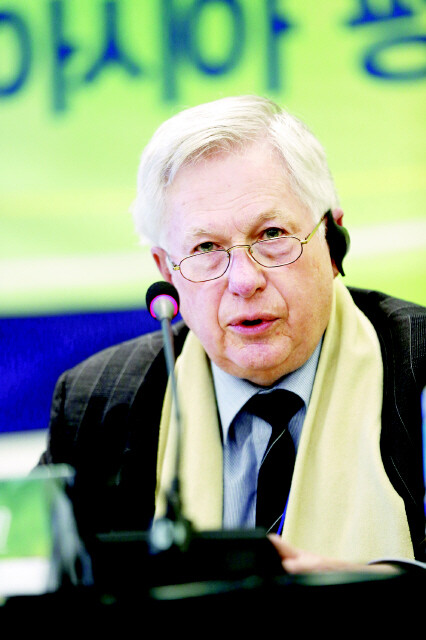hankyoreh
Links to other country sites 다른 나라 사이트 링크
Before reunification, Korea is a whole lot different than Germany

“The geopolitical situations in Korea and Germany are different. Korean unification would require much more preparation than Germany.”
This was the message delivered on Nov. 18 by Gyorgy Szell, an emeritus professor at Germany’s University of Osnabruck, in a presentation on “The Lessons of German Unification.” Szell was speaking on the first day of the Hankyoreh-Busan International Symposium at the second session on the topic of “inter-Korean relations for peace in East Asia.”
Szell based his characterization on three factors: South Korea’s economic and welfare levels lagging behind those of Europe, extreme political conflict between South and North, and lingering vestiges of South Korea’s dictatorial past.
“Social divisions in Germany have still not improved from twenty-five years ago,” he noted.
Szell’s message is that South Korea should acknowledge the possibility that reunification could take decades and avoid Germany’s failures by making systematic preparations in “slow, small steps.”
When the Berlin Wall fell in 1989, the first Chancellor of a unified Germany, Helmut Kohl, promised a “flowering landscape” within two years. That promise wasn’t realized; instead, a mood of failure settled in over the former East Germany.
Indeed, the images Szell relates from the former East were grim. The unemployment rate was twice as high as in the West; the cost of living was higher, but wages were an average of 30% lower. He also described a growing wave of “Ostalgia,” or longing for the East Germany of the past. The social system - including general hospitals, technical schools, nursery schools, and daycare centers - suffered a collapse. Women in particular reported feeling like the “losers of German unification,” Szell said. Many have given up their jobs and become stay-at-home mothers amid the lack of support for social systems. The birth rate plummeted.
The stark reality has led in turn to hatred toward others. Launched in Oct. 2014 in Dresden, the Pegida campaign (Patriotic Europeans Against the Islamisation of the Occident) has since gone to on to influence followers in other regions. Its success is evidence of the widespread xenophobia and racism in the East. The National Democratic Party of Germany and Alternative for Germany won 10% of votes in recent local elections and 7% in last year’s European Parliament elections - signaling a growing neo-Fascist political presence in the local councils of five regions in the former East.
According to Szell, Germany’s failure stems from poor policy decisions.
“Poorly managed economic and social policies for unification continue to have an influence twenty-five years later,” he said.
As an example, he cited currency integration between East and West. Over objections from the West’s central bank, integration was implemented on a one-to-one basis instead of the four-to-one basis recommended as appropriate. The decision, which was influenced by politicians’ pork-barrel priorities, ended up leading to corruption.
The post-unification dismantling of the East German economy also resulted in massive unemployment, with around one-third of the population losing their jobs. West German businesses took the lion’s share of profits from economic activity in the East, while high-ranking positions in politics, the courts, and scientific areas were uniformly given to West Germans - signaling a failure to shed longstanding prejudices in the “colonization” effort.
Szell offered a number of specific preparations that Seoul should attempt before unification. First, he advised that both South and North work on building trust, bolstering economic cooperation, cutting military spending, developing post-unification blueprints for different areas (economy, politics, administration, education, culture, and social security), opening borders and permitting communication, and strengthening cultural and scientific education.
For Pyongyang in particular, he advised allowing the emergence of a civil society, liberalizing the press, ending dictatorship, halting missile testing, and following Iran’s lead in signing agreements for development and production of nuclear power. For Seoul, he advised resuming the Sunshine Policy, abolishing the National Security Law, and halting joint military exercises with the US.
By Kim Oi-hyun, staff reporter
Please direct questions or comments to [english@hani.co.kr]

Editorial・opinion
![[Column] Has Korea, too, crossed the Rubicon on China? [Column] Has Korea, too, crossed the Rubicon on China?](https://flexible.img.hani.co.kr/flexible/normal/500/300/imgdb/original/2024/0419/9317135153409185.jpg) [Column] Has Korea, too, crossed the Rubicon on China?
[Column] Has Korea, too, crossed the Rubicon on China?![[Correspondent’s column] In Japan’s alliance with US, echoes of its past alliances with UK [Correspondent’s column] In Japan’s alliance with US, echoes of its past alliances with UK](https://flexible.img.hani.co.kr/flexible/normal/500/300/imgdb/original/2024/0419/2317135166563519.jpg) [Correspondent’s column] In Japan’s alliance with US, echoes of its past alliances with UK
[Correspondent’s column] In Japan’s alliance with US, echoes of its past alliances with UK- [Editorial] Does Yoon think the Korean public is wrong?
- [Editorial] As it bolsters its alliance with US, Japan must be accountable for past
- [Guest essay] Amending the Constitution is Yoon’s key to leaving office in public’s good graces
- [Editorial] 10 years on, lessons of Sewol tragedy must never be forgotten
- [Column] A death blow to Korea’s prosecutor politics
- [Correspondent’s column] The US and the end of Japanese pacifism
- [Guest essay] How Korea turned its trainee doctors into monsters
- [Guest essay] As someone who helped forge Seoul-Moscow ties, their status today troubles me
Most viewed articles
- 1[Column] The clock is ticking for Korea’s first lady
- 2Samsung barricades office as unionized workers strike for better conditions
- 3After 2 months of delayed, denied medical care, Koreans worry worst may be yet to come
- 4[Correspondent’s column] In Japan’s alliance with US, echoes of its past alliances with UK
- 5[Column] Has Korea, too, crossed the Rubicon on China?
- 6Hong Se-hwa, voice for tolerance whose memoir of exile touched a chord, dies at 76
- 7[Editorial] When the choice is kids or career, Korea will never overcome birth rate woes
- 8Constitutional Court rules to disband left-wing Unified Progressive Party
- 9Nearly 1 in 5 N. Korean defectors say they regret coming to S. Korea
- 10‘Right direction’: After judgment day from voters, Yoon shrugs off calls for change